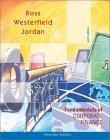A check-cashing store is in the business of making personal loans to walk-up customers. The store makes
Question:
A check-cashing store is in the business of making personal loans to walk-up customers. The store makes only one-week loans at 11 percent interest per week.
a. What APR must the store report to its customers? What is the EAR that the customers are actually paying?
b. Now suppose the store makes one-week loans at 11 percent discount interest per week (see Question 60). What’s the APR now? The EAR?
c. The check-cashing store also makes one-month add-on interest loans at 8 percent discount interest per week. Thus, if you borrow $100 for one month (four weeks), the interest will be ($100 × 1.084) – 100 = $36.05. Because this is discount interest, your net loan proceeds today will be $63.95. You must then repay the store $100 at the end of the month. To help you out, though, the store lets you pay off this $100 in installments of $25 per week. What is the APR of this loan? What is the EAR?
Data from Problem 60
This question illustrates what is known as discount interest. Imagine you are discussing a loan with a somewhat unscrupulous lender. You want to borrow $20,000 for one year. The interest rate is 11 percent. You and the lender agree that the interest on the loan will be .11 × $20,000 = $2,200. So the lender deducts this interest amount from the loan up front and gives you $17,800. In this case, we say that the discount is $2,200. What’s wrong here?
Step by Step Answer:

Fundamentals Of Corporate Finance
ISBN: 9780072553079
6th Edition
Authors: Stephen A. Ross, Randolph Westerfield, Bradford D. Jordan





